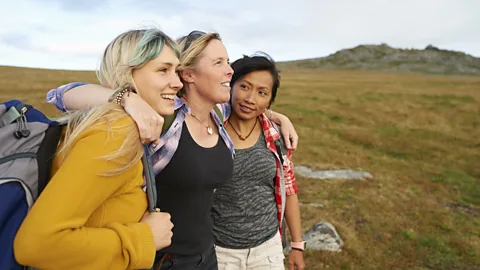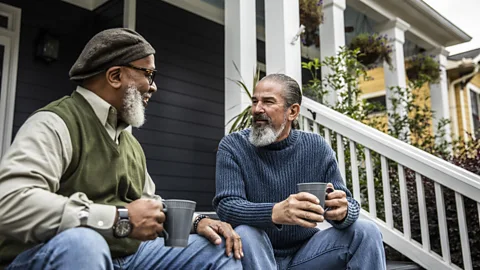Why friendship makes us healthier
 Getty Images
Getty ImagesIt's well-established that romantic relationships can improve your health and even help you to live longer. But does friendship bring the same benefits?
Benny Shakes has to ration his energy when it comes to his friends. "I'm cancelling friend dates all the time," he admits.
He has a high-energy job, as a touring stand-up comedian based in Nottingham, UK. He also has mental health issues and cerebral palsy, so "it is hard to keep up with friendships a lot because of my condition. I'm tired most of the time because it takes it out of me just sitting here working on the computer. It's draining."
Thankfully his friends and partner understand his need for regular solitude (which, unlike loneliness, is voluntary – read more from BBC Future about the benefits of solitude). Friends help him in numerous ways, from reminding him to take his medications to shoring him up through periods of mental ill health.
But that help goes both ways. For example, together with his friend Mark Nicholas, during the Covid-19 pandemic he set up a group chat with other disabled comedians and artists. "And now we support 25 people who if they're upset or they need support, they can message the page, and one of us will support each other," Shakes explains.
While Shakes' life experiences are unique, he's far from alone in having experienced the many curative properties of friendship. From improved moods to better cardiovascular health, friendships have clear benefits for our minds and bodies – even if historically they've been treated as less valuable than romantic and family relationships.
The many health benefits of friendship
Science journalist Lydia Denworth, who wrote a book about the science of friendship, marvels at how social isolation affects your immune system. For example, when you're lonely your white blood cells change their behaviour, leading to more inflammation and a weakened immune response. "I think it's just amazing that our bodies work this way," Denworth says.
It's not just the immune system that is bolstered by social connection. Socially integrated people tend to have longer and healthier lives – they're at lower risk for hypertension. Friends can also help people to sleep better and even heal faster, as research involving skin puncturing suggests.
Conversely, strained friendships are significant predictors of chronic illness. In some cases social disconnection is a greater mortality risk than common culprits like smoking and high cholesterol.
Part of this comes down to the manifold links and overlaps between mental and physical health. The connections between different aspects of health are obvious to Donna Turnbull, the community development manager for Voluntary Action Camden, a charity supporting other charities in north London. "It's generally accepted that social isolation will pretty much exacerbate any health issue," Turnbull says. For instance, "If you're not being socially active, you're quite often not being physically active as well."
It isn't necessarily the case that friendship is better for health than other types of strong social bonds – the kind that are stable, positive and reciprocal.
The research of Saida Heshmati, a psychologist at Claremont Graduate University in the US, and her colleagues suggests that "regardless of where these little actions of love come from, or what relationship they come from, the quality of those interactions is very important – meaning that you can basically receive care when you're sick from a family member, but you can also receive it from a friend, and that still conveys love."
 Getty Images
Getty ImagesBut historically friendship's role in keeping us healthy has been neglected and trivialised. Decades of research on science show that that's a mistake. "Friends deserve more respect, and they shouldn't always be the last on our list in terms of priorities," Denworth warns.
In some cases, friendship may actually be more protective than marriage or family. One analysis drawing on data from 97 countries found that while valuing family and friends was linked to better health and more happiness overall, for older adults, friendships were even more important to health and happiness.
Different types of friendships
While there appear to be some common patterns in friendship across cultures, the bulk of the research has been on wealthy and majority-white societies. There has been little attention given to the particularities of friendship among other groups, such as queer or disabled communities.
Heshmati says that across cultures, friendship is a voluntary type of interdependence that changes over time, where both individuals pursue their social and emotional goals. But it's likely to be affected by cultural expectations – for instance around whether interactions should be more spontaneous or based on more formalised rituals and obligations, and whether loyalty and trust matter more than autonomy and personal growth.
Significant differences do show up in research on friendship across the life course. There's something of a U-curve when it comes to time spent with friends, Denworth reports: friendships are hugely important for building adolescent identity, less prominent for middle-aged adults, and rebound a bit for the elderly.
There's a strong indication of this from neuroscience research as well. Several studies have used functional magnetic resonance imaging (fMRI) to study patterns of brain activity as participants interact with friends. The results indicate that it activates the social brain regions, which are associated with skills such as understanding others' perspectives. It also seems to lead to heightened activity in the striatum, a region involved in reward.
In one study, researchers found that when participants were given the opportunity to win money for or share it with a friend, or a disliked, neutral or unfamiliar peer, reward regions were most active when they chose a friend.
Berna Güroglu, a developmental neuroscientist at Leiden University in the Netherlands, explains that "in adolescence specifically, there's definitely an increased reward sensitivity" when winning rewards for a long-time best friend. "It peaks around 15-16 years of age."
Heshmati refers to the socioemotional connectivity theory, which holds that as people age and their sense of time changes, they become more selective about their social interactions. "And so while in young adulthood, you might spend time on different types of friendships and relationships, just because you're exploring… towards older adulthood you're going to be now cutting out a lot of the relationships that are not beneficial to you, and only keeping the ones that are beneficial in terms of both psychological and physical health."
The quality of our friendships matters, especially as people get older. But even casual friendships are helpful across the lifespan. Weak ties are more helpful for broadening our access to information, while strong friendships are the ones that provide key support.
A diversity of friendships is helpful as well. Having a wider variety of social relationships appears to be better for our health, and may even enhance our ability to ward off a cold.
Heshmati says that weaker friendships can still be worth maintaining as long as people are on the same page about their expectations. So if one friend expects weekly visits while the other friend prefers a few WhatsApp exchanges a year, there's a clear mismatch.
 Getty Images
Getty ImagesFor Denworth, who talks of concentric circles of friendships based on closeness, "It's better that the ambivalent relationships don't live in the centre of the circle." Ideally this type of friendship would be repaired, culled, or moved to a further circle. For while strong friendships carry strong health benefits, a higher number of ambivalent relationships is associated with higher blood pressure, accelerated cellular ageing, and other harms.
As Shakes says of some friendships: "You can have tonnes of friends and you can still be lonely."
The practical implications of friendship science
Research suggests a link between time spent with friends and whether the brain later processes rejection as threatening. For instance, a study of Los Angeles high-schoolers found that those who had spent more time with friends showed less sensitivity to social exclusion, even up to two years later.
"The more you have positive interactions with friends, you could be keeping a well-functioning reward system that could have counter effects on these neural responses that you have when you experience more adverse social interactions, or feel excluded," Güroglu muses. But she stresses that this is speculative, as a great deal of neuroscience research remains to be done over longer stretches of people's lives.
And while "patients with depression have been shown to have some problems with the functioning of the reward system", it will take more research to illuminate the individual differences in how this works.
What's clear from the broader science of friendship is that cultivating friendship should be a lifelong process. "People in midlife make a mistake if they think they can just wait until their 50s and 60s to focus on friendship," Denworth says, while acknowledging that midlife pressures of family and career mean that friends often fall to the wayside. "It's a life course and it's a muscle that has to be worked."
On the clinical side, this means that health interventions focused on combatting loneliness shouldn't just target older people. Some doctors may be asking older patients about their friendships given the protective effect against dementia, but these aren't the only patients who could benefit.
Social prescribing, where doctors prescribe social or recreational activity for their patients alongside or instead of more conventional medical treatment, has also often been associated with the elderly. But Turnbull, who develops social prescribing activities at Voluntary Action Camden, feels that it's useful across the age spectrum. "Loneliness isn't the domain of older people," Turnbull notes.
She's seen powerful benefits from Camden residents taking up volunteering, joining walking groups, and the like. Some people stop taking antidepressants, for instance, though this should only be done in consultation with a doctor.
The biggest demand she sees is not for one-off activities but for longer-term programmes that can build lasting friendships. "It has a knock-on effect," Turnbull believes. "You build your social networks, you become more capable of dealing with health issues or those wider determinants of health like housing, etc."
Of course, social prescribing isn't a cure-all, and may not be affordable for everyone. "The cost of living is definitely stopping people socialising," says Turnbull. Access to transport and even the price of a cup of tea may be barriers.
Generally, while there is a need for more systematic evidence about what types of interventions work best when it comes to health-promoting friendships, there are simple steps that nearly all of us can take now. One basic lesson is that friends shouldn't be taken for granted. As Denworth says: "We have limited time in the day, and friendship does require an investment."
That investment isn't always easy, but it pays dividends. Shakes said that his doctors, on understanding his mental health situation, said he needed to start finding friends. "But I didn't really understand what it meant," he reflects now.
"I mean, it took me 18 years to realise and to understand my condition, my mental health and get the right balance of friends and care."
--
